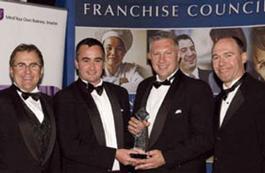An Australian Franchisee Case Study

Organised by the Franchise Council of Australia (FCA), the Excellence in Franchising Awards 2008 were sponsored by MYOB.
State award winners were announced last August, who then went head-to-head with other regional winners and national category nominations. National winners were announced at a gala event on 18 October 2008, during the FCA’s National Franchise Convention in Sydney.
The annual awards showcase both Australian franchise businesses and individual operators, recognising outstanding achievements within franchising.
Applicants are assessed by a panel of industry experts, measured against specific criteria. The judging process covers an extensive range of business management features, such as financial planning, marketing and personal
development.
According to Steve Wright, Executive Director of the FCA, “The annual Awards recognise and reward hard working Australians in the small to medium sized business sector and provide a platform for these companies to showcase their products and services on the national stage.”
Steve continues, “The robust state of franchising is clearly evident in the calibre and quantity of all submissions received.
Nominations in all categories were up on last year’s figures, with the Franchisee of the Year Award attracting the highest number of entries.”
Franchisee of the Year was awarded to dual Banjo’s franchisees, Mark Maumill and Jason Love, who were also winners of the VIC/TAS award.
Banjo’s Bakehouses are quite unique as they offer all the elements of a modern dine-in café, together with the traditional products of a bakery. Their other point of difference is that everything is freshly produced on site.
The wholly Australian-owned Banjo’s is the only franchise system based in Tasmania. There are 35 Bakehouses across Tasmania, Victoria, New South Wales and Queensland.
Mark and Jason own five Banjo’s franchises together, and Mark has either part or individual ownership in three others. The Tasmanians began buying Banjo’s Bakehouses in their home State, but have now ventured into Victoria and Queensland.
Mark is thrilled with both wins: “I think it’s fantastic. It’s acknowledgement of all the hard work, which has been put in since 1999.
The approach of strategic partnerships to go forward and expand, and the resources in which we’ve been able to master to move that forward, has been recognised. I don’t think many single franchisees could grow as quickly as we have over the last couple of years.”
Mark and Jason, at 43 and 36 years respectively, are both married with 6½ children between them. Multi-unit franchising not only allows them quality time with their young families, but it’s ensuring that their future includes financial comfort without working ridiculous hours.
Commenting on the popular franchise, Mark says, “Banjo’s is a real institution in Tassie. I think the concept’s brilliant and it obviously works on the mainland. We’re more of a café now.”
He explains that Banjo’s is a ‘scratch’ bakery: “We make everything fresh every day. We buy the raw ingredients and put it all together to make the bread etc, whereas a supermarket bakery would just add water. A lot of bakeries out there buy a vast range of their products such as their pies, but we make everything fresh on site.
“We’ve got a real edge over most competitors because we cover five market segments: bread, coffee, sweets, sandwiches and hot food. We can be quite strong in areas where traditional bakeries never go.”
Originally a police officer, Mark undertook a Masters in Business part-time at university while working full-time. In 1999, Mark says a job opportunity was presented to him by Banjo’s: “I went into the corporate side of Banjo’s for a couple of years, working for the franchisor. I was the Baking Operations Coordinator.
“In December 2000, I opened my first bakery in partnership in Strahan, a little town on the west-cost of Tassie with a population of 500. It’s a tourist town and we get a couple of hundred thousand people through there every year.”
In 2005, Mark went into partnership with Jason. “I started to get to know Jason in 2004”,says Mark. “He was the Bakery Manager at Banjo’s Kingston. As a result of the sale of that bakery, his position was made redundant and so I quickly stepped in and offered him a partnership.”
Jason shares his insight, “The main advice I would give people is you can’t go into business and just expect it to happen. There are many challenges. It can be a lot of hard work to put in but if you do that, then the rewards should follow.”
He also points out that franchisees should ensure they choose their acquisitions wisely: “Make sure that you go into the right business, at the right place, with the right people.”
Jason says franchisees specifically interested in multi-units should possess high energy levels and drive, and very strong people skills: “On top of that, you also need to make sure you’ve got your finger on the financials and business plans and so on.” He continues, “A partnership has worked very well for us. Mark’s very strong with the financials and business planning; I’m very strong with people and store management.
So between the two of us, we cover most of the areas that are required.” Jason highly recommends joint franchising,
“It’s something to consider. You’ve got a wide range of skills covered by two people, so there’s never one area of your business that falls back and suffers. My feeling is that if somebody really wants to be on top of their franchise, if it’s a significant franchise, it’s very hard for one person to do that.”
Mark explains how he and Jason originally operated their franchises: “Initially, Jason was doing all the day to day bakery management, and that freed me up to do more work on the business than in the business. That’s worked reasonably well over the years, having an equity partner on the floor.
“In late 2006/early 2007, we started looking at the future and where we wanted to go. We started doing some reasonably serious business planning and it’s resulted in where we are now and where we’re going.”
Mark and Jason plan to continue growing their mini-empire, by engaging third party franchisees to manage the operations in each new bakery. Mark explains, “Basically we’re setting up hubs in different locations and putting an equity partner in each location.
“Bendigo (VIC), Cleveland (QLD) and Redcliffe (QLD) have all got equity partners that aredoing the day to day management side. They’re fully trained Banjo’s franchisees.” This allows Mark and Jason to work behind the scenes from now on.
Jason is especially excited that his sister Angela has become the pair’s equity partner in Cleveland: “She’s worked for me for four years and it’s exciting to give her the opportunity to actually own her own Banjo’s, rather than just work for me – that’s been something pretty special for me.”
He also explains selecting particular sites is extremely strategic; “It’s so important to have your area analysed professionally, as opposed to putting guesswork into it. If you’re going to analyse the setting up of a store or buying
one, then make sure you get involved with the professionals who actually analyse it properly.”
He goes on, “There’s an old saying with our business coach that, ‘the profit’s in the purchase price’. You’ve got to get that sale right or that set up of that store right. We’ve got quite a few different demographics: we’re in country towns, we’re in the city; we’re on the waterfront in Hobart.”
For some years now, Mark has been interested in developing different pipelines of income: “With multi-franchising, what you’re doing is spreading the risk and you’re receiving other sources of income all the time. It might be the same chain, but because we’re in different geographical areas, if say Hobart has a downturn or loss, Brisbane will probably prop us up. It really spreads the risk. “Also, it enables you to have the infrastructure in place to get away from the day to day management of a business, and concentrate on the growth and the well-being of thebusiness. If you’re in there doing 40 hours a week on the floor, it doesn’t allow many hours to grow your business.”
Mark recently attended a multi-franchising conference, which further enhanced his business beliefs: “Even McDonald’s are averaging 2.2 stores per franchisee now. I definitely see it as the way of the future.
There doesn’t seem to be a huge amount of people wanting to become franchisees with the labour shortages. I see it as a natural progression that franchisors would want proven franchisees to become multi-franchisees. It’s something that should be encouraged.”
About two years ago, Banjo’s altered its structure and introduced a Board of Directors. Mark finds his franchisor extremely supportive: “We’re very lucky franchisees, because we’ve got a very good Board in place and the franchising experience is fabulous. “Since the Board’s been established, they’ve brought in a multi-franchisee policy. For us to have grown and to continue to grow in the future, we’ve got to tick all the boxes in their policy, which I’ve since learnt is a mile ahead of almost every franchise in Australia.
There’s nothing better than knowing what the benchmarks are and the hurdles you have to jump through to get there.”
Jason describes what the trophy means to him, “It’s probably just that ‘fuzzy’ feeling for me as opposed to anything else. Winning the award means a bit of recognition for many hard years of work, but not just from myself. It’s more a group feel, so it’s my family and especially my first store.”
Jason is talking about his Banjo’s in Huonville, a little country town 45 minutes from Hobart: “We’ve managed to create a really personalised culture with our staff, so they’ve been a massive part of it. For me, what the award’s done the most is reward myself, my family and the staff at my first store. It’s been very exciting for them as well.”
He and Mark are also enjoying the many prospects presented to them, to meet with other franchisors, franchisees and service providers. “A lot of networking opportunities have started to open up”, says Jason. “It’s pretty exciting to come across those sorts of people and learn from them.”
With just one trophy presented, Mark claims Jason took it home. Jason agrees but then reveals the trophy was damaged. “It broke!” he laughs. “It broke in the plane in the luggage compartment but we’re having that fixed.”
Mark announces he is five years away from retiring: “We both have plans to make ourselves redundant. The eventual dream is that we’ll grow to a size where we have full-time staff, including a CEO controlling our bakeries and support staff, and working in conjunction with the franchisor.” And Mark says the whole concept has a ripple effect: “By growing to a reasonable level within each region, it enables our business partner on the ground to then step out.”
Believing that the Banjo’s product is a major part of his and Jason’s success, Mark says: “The Banjo’s concept is fabulous. People ask me why I don’t go and franchise something myself.” He laughs, “It’s just too much hard work! The franchisor comes to us with sites or we find sites ourselves, and then it’s just duplicating what we’ve already done.”
He continues, “The franchisor provides the brand, the concept, the major marketing initiatives, all the training and resources – everything a franchisor brings to the table. They even have the field consultants that go out to ensure the stores are running well.”
Planning to retire as shareholders, Mark explains what would be required of him and Jason: “All we need to do is support our staff.
We’ll probably end up as business coaches, to keep them focused. It just gives us the freedom to do what we want, when we want to.”
Request information on franchise ownership of
Banjo’s franchise

